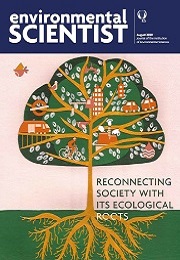Recognition of feedback between human activities and our supportive ecosystems, in turn affecting human health, economic prospects, security and opportunity, has been well documented. In this edition of the environmental SCIENTIST, we explore the need for a new paradigm that places ecosystems and their processes at the centre of societal thinking, policy, fiscal systems and resource use habits, ultimately reconnecting society with its ecological roots. Read about how a systems approach could provide positive transformations for human health, water management, flood regulation, defence, nature conservation and many more areas.




